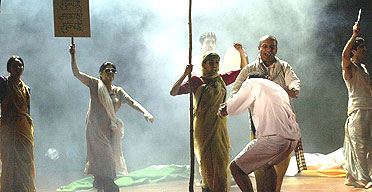The title "Midnight's Children" refers to those Indians born within the first hour of Independence, August 15, 1947. Of them, Saleem Sinae, who arrived on the stroke of midnight, tells us time is running out if he's to do something meaningful before he dies. For he is "literally disintegrating." He then takes us between the present (where we meet mother and, eventually, a witch) and the past, starting with his physician-grandfather's courtship of his grandmother through a hole in a sheet! From that moment, the fate of the family and their country intertwine.
Via stills and videos, backlighting and projections of photos, films on full and split screens, music and noise in light and darkness, and scenes acted out by a large cast singly and simultaneously, widely and deeply, most assuming multiple roles, we follow.
Epic events (e.g. a bloody massacre at Amritsar, assassinations of anti-Partitionist Mian Abdullah and later Ghandi, language riots at Bombay, creation of the state and later a military coup in Pakistan, Bangladesh's struggle) are mirrored by Saleem's personal and familial ones. Everything is skewed by Saleem's nurse having switched him at birth with the son of less socially and economically fortunate parents. We also get to compare the progress of the other male child, who remains in India, with Saleem who's sent to Pakistan. Saleem also identifies himself with -- and later betrays -- Midnight's Children. They will eventually be sterilized.
There's more! In fact, there's too much. Midnight's Children is more of an illustrated novel than a drama. As a rule, the wonderful historical visuals interest more than the story, whose episodes tend to be repetitive. (How many birth throes need to be illustrated? How often need we peer into headlights of police or military vehicles? Must we again and again visit the Pickle shop?) Women are stereotyped as worried family nurturers or -- whether in the form of a tomboy sister who matures as a selfish socialite or as sorceress Parvali -- witches. In short, we get all the disadvantages of a Brechtian type "learning play" without the advantage of clear Brechtian episodic scenes or Brecht's memorable language.
Despite the sustained performance of Zubin Varla as Saleem, it's the stuff about his prominent nose that we remember. (How different our memories, for example, of the similarly dual-natured Good Person of Setzuan and his/her society!) Nevertheless, from the visuals alone, one is bound to learn something from Midnight's Children. So it's worth seeing. It would be more so with judicious editing toward a compelling crystallization of elements.

